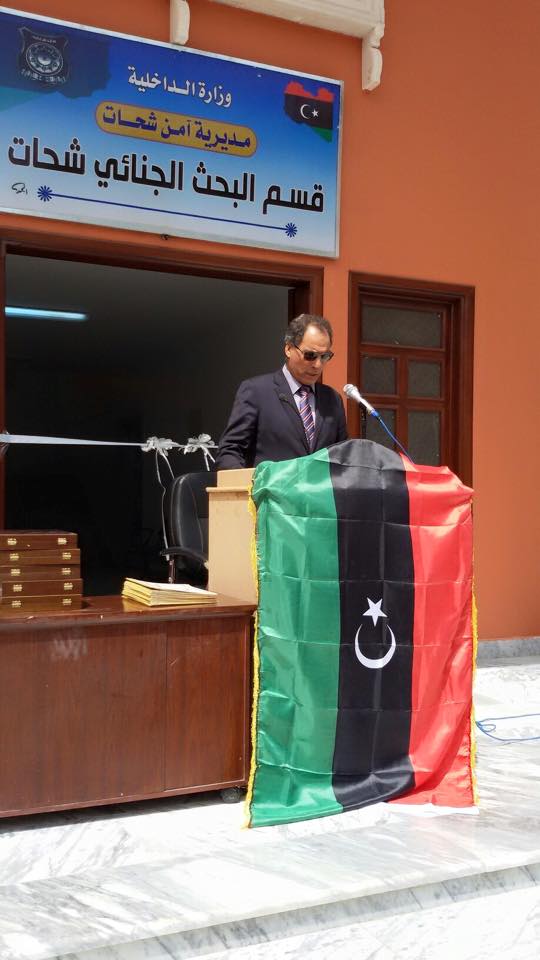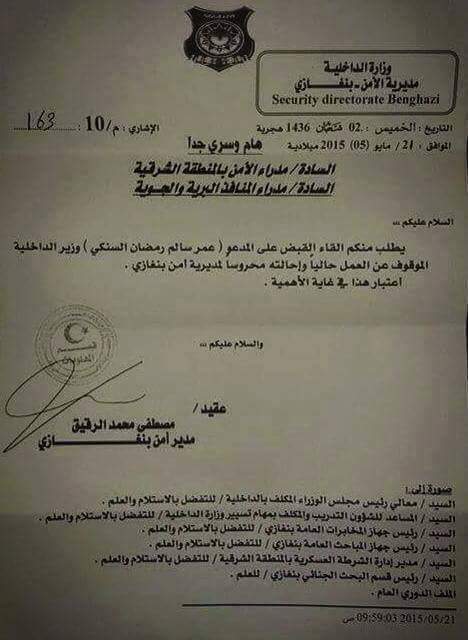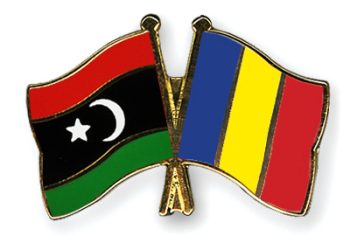By Libya Herald reporters.

Tripoli/Benghazi, 22 May 2015:
In a startling and damaging display of political disunity within the internationally recognised government, the . . .[restrict]newly installed police chief in Benghazi has ordered the arrest of the Omar Sinki, officially still Minister of the Interior in the Beida government.
Colonel Mustafa Ragaig, who was appointed by the interior ministry as police chief in Benghazi (or more formally, head of the security directorate) two months ago but only took up office last week, has ordered checkpoints, airports and border crossing to detain Sinki if they encounter him and send him to Benghazi.
The move by Ragaig, announced yesterday, is thought not to be legal. Normally, only the public prosecutor is supposed to issue such a warrant.
No reasons have been given for the move although Ragaig is said to have raised allegations about financial corruption. However, political infighting is seen as the real reason although it is not known if the police chief was acting under orders from above or made the decision himself.
In November, Thinni sacked Sinki as Interior, after Sinki had publicly attacked General Khalifa Hafter. However. Sinki refused to go, saying that he had been appointed by the House of Representatives (HoR) and only it could sack him. The House, although it had appointed Hafter as commander of the Libyan armed forces, agreed with Sinki and upheld his appointment in March.
Thinni, however, has effectively ignored this, refusing to accept Sinki back as interior minister and has instead relied on the deputy minister, Colonel Ahmed Ali Baraka, as the acting interior minister.
Two months ago, in a no-holds-barred attack on Sinki, the Prime Minister accused him of incompetence, complaining that he had been forced on him by the HoR. It had chosen him, Thinni claimed, because of pressure on it by the head of the National Forces Alliance, Mahmoud Jibril, and also because it wanted a top minister to be from Misrtata – which is where Sinki comes from.
There are suggestions, however, that there is a longstanding personal feud between Sinki and Ragaig. At the beginning of the month, Sinki is reported to have sent a letter sacking Ragaig and reappointing his predecessor, Colonel Ramadan A-Wahaishi.
It would not be the first time Ragaig has been sacked as Benghazi’s police chief. He was appointed head of Benghazi’s security directorate in November 2012 following the assassination of Colonel Faraj Drissi.
He was sacked three months later by the then interior minister, Ashour Shuwail, following protests by the police who accused him of not being up to the task of ensuring security in Benghazi.
Meanwhile, despite the arrest order and being shunned by the Prime Minister, Sinki has been continuing to operate as interior minister.
Yesterday, the same day that Ragaig was ordering his arrest, he opened the new criminal investigation department in Shahat, accompanied by various ministry and local security officials.
In his speech, he made pointed reference to the fact that the HoR was the highest authority in the country.

[/restrict]










